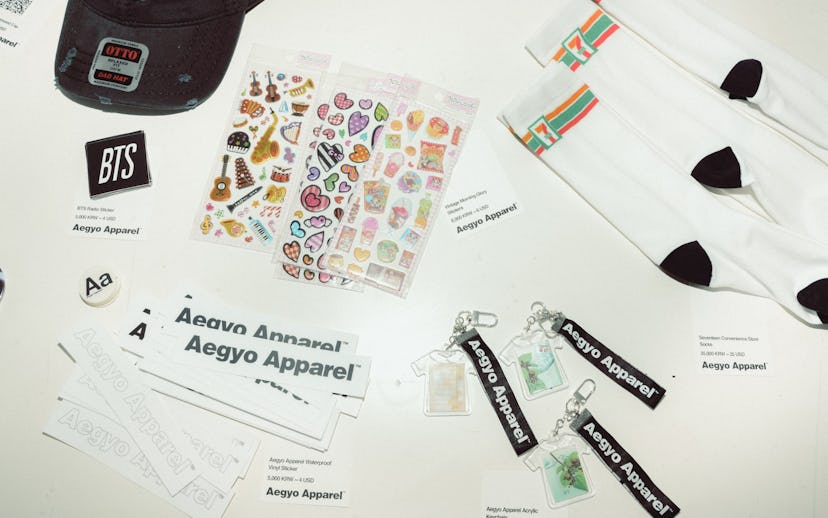
Fashion
Is This The Coolest Bootleg K-Pop Merch?
Aegyo Apparel’s first Seoul pop-up explores culture, consumption, and “cease-and-desist-core.”
On a recent Friday in Seoul’s trendy Itaewon district, the Los Angeles-based clothing brand Aegyo Apparel popped up with bootleg merch in the grand tradition of Warhol and Lichtenstein. But instead of soup cans and comic books, it sold “I (heart) NWJNS” tees and Seventeen-as-7-Eleven logo socks.
Co-founders Andrew Hong and Emi Palmer, who made their first Aegyo Apparel T-shirt in 2022, say they’re drawn to the “extreme” nature of K-pop as a reflection of late-stage capitalism — just as megacorporations manufacture and market products, so do South Korean entertainment labels with their idols. “There are many similarities in the way these two things are consumed, so we synthesized these things into a clothing brand to be consumed once again,” Palmer says. In fact, Aegyo was born from their own experience with K-pop’s mass culture: After researching the genre for an art project, they started listening to more and more music and ended up becoming genuine fans.
Inside the small shop, Hong DJs his own remixes like “Pansori Depop Gatekeep Gaslight Girlboss Remix (™_edit_)” while wearing a tee featuring JYP’s magnified face. Palmer, meanwhile, reorganizes a display of keychains and stickers, adjusting the angle of an “I Love Dokdo” notebook. Their bestselling product is a white T-shirt with BTS’ full name, Bangtan Sonyeondan — or “Bulletproof Boy Scouts” — printed in the style of the Costco logo. On the back is a modified version of the big-box store’s food-court menu, where items are paired with members’ names and prices to represent their birth dates. (Jungkook is a slice of pizza for 97.09.) Another top seems to reference a Casio meme design that spells out STAYC as an acrostic poem: “I love… South Korea Thinking Art Yoon Cryptocurrency.”
On a folding table, a pile of NTS Radio-style “BTS” stickers sits next to a stack of vintage stickers from Morning Glory, a once-ubiquitous stationary chain that holds a certain kitschy nostalgia for most Korean adults. But while Hong and Palmer specifically curated the items for their Seoul pop-up to include references recognizable to Koreans, they say that Aegyo’s concepts are globally relevant, even if the brand was created from the perspective of K-pop consumption in the United States by a largely non-Korean fanbase.
“When we were doing a pop-up in New York, we were angling it towards fashion and art people, and it was well-received,” Palmer says. “And in L.A., we were catching more ARMY K-pop fans — and it was also well-received. Both groups can understand it.” She adds that, because they view Aegyo as pure commentary on the act of consumption, they’re happy to let their audience interpret their work however they’d like. “We never know all aspects and contexts of what we’re consuming,” she says, “so we wouldn’t expect consumers of our project to know everything either.”
One of their newest pieces is designed like a popular water bottle in Korea called “Jeju Samdasoo” but with “Aegyo Apparel” written across the front. Hong calls it “cease-and-desist-core” because, miraculously, despite using IP from major corporations and K-pop companies — neither of which have a reputation for tolerance — they haven’t received any letters so far. Still, they say they’re planning to focus their next products on their own brand rather than copyrighted logos or artist names.
“It’s a concern of how much the project can scale because of that,” Palmer says. “I’m sure the letter will come someday.”